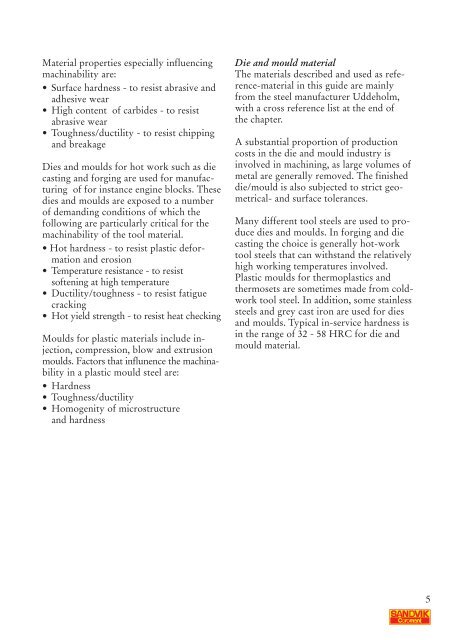Die & Mould Making - CNC - Computer Numerical Control
Die & Mould Making - CNC - Computer Numerical Control
Die & Mould Making - CNC - Computer Numerical Control
You also want an ePaper? Increase the reach of your titles
YUMPU automatically turns print PDFs into web optimized ePapers that Google loves.
Material properties especially influencing<br />
machinability are:<br />
• Surface hardness - to resist abrasive and<br />
adhesive wear<br />
• High content of carbides - to resist<br />
abrasive wear<br />
• Toughness/ductility - to resist chipping<br />
and breakage<br />
<strong>Die</strong>s and moulds for hot work such as die<br />
casting and forging are used for manufacturing<br />
of for instance engine blocks. These<br />
dies and moulds are exposed to a number<br />
of demanding conditions of which the<br />
following are particularly critical for the<br />
machinability of the tool material.<br />
• Hot hardness - to resist plastic deformation<br />
and erosion<br />
• Temperature resistance - to resist<br />
softening at high temperature<br />
• Ductility/toughness - to resist fatigue<br />
cracking<br />
• Hot yield strength - to resist heat checking<br />
<strong>Mould</strong>s for plastic materials include injection,<br />
compression, blow and extrusion<br />
moulds. Factors that influnence the machinability<br />
in a plastic mould steel are:<br />
• Hardness<br />
• Toughness/ductility<br />
• Homogenity of microstructure<br />
and hardness<br />
<strong>Die</strong> and mould material<br />
The materials described and used as reference-material<br />
in this guide are mainly<br />
from the steel manufacturer Uddeholm,<br />
with a cross reference list at the end of<br />
the chapter.<br />
A substantial proportion of production<br />
costs in the die and mould industry is<br />
involved in machining, as large volumes of<br />
metal are generally removed. The finished<br />
die/mould is also subjected to strict geometrical-<br />
and surface tolerances.<br />
Many different tool steels are used to produce<br />
dies and moulds. In forging and die<br />
casting the choice is generally hot-work<br />
tool steels that can withstand the relatively<br />
high working temperatures involved.<br />
Plastic moulds for thermoplastics and<br />
thermosets are sometimes made from coldwork<br />
tool steel. In addition, some stainless<br />
steels and grey cast iron are used for dies<br />
and moulds. Typical in-service hardness is<br />
in the range of 32 - 58 HRC for die and<br />
mould material.<br />
5



